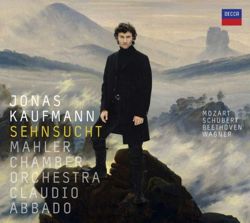|
|
|
|
|
|
|
|
| Opera UK, November 2009 |
| MAX LOPPERT |
Jonas Kaufmann — Mozart, Schubert, Beethoven, Wagner
Arias and scenes from Die Zauberflöte, Fidelio, Fierrabras, Alfonso und
Estrella, Lohengrin and Parsifal. With Margarete Joswig (mezzo-soprano),
Michael Volle (bass-baritone), Chorus of the Teatro Regio, Parma, Mahler
Chamber Orchestra, c. Claudio Abbado. Decca 478 1463 (one CD)
|
|
Disc of the month |
|
|
 Too
good to be true: this was my first response to Jonas Kaufmann’s new disc.
But each re-listening has brought new things to praise, new confirmation of
the singer’s extraordinary gifts. This all German operatic selection, his
second solo CD for Decca, bears an even clearer personal stamp than the
French-German-Italian Romantic Arias, his first. Too
good to be true: this was my first response to Jonas Kaufmann’s new disc.
But each re-listening has brought new things to praise, new confirmation of
the singer’s extraordinary gifts. This all German operatic selection, his
second solo CD for Decca, bears an even clearer personal stamp than the
French-German-Italian Romantic Arias, his first.
Schubert’s Alfonso apart, all the roles represented here belong to his stage
repertory. The interleaving of arias with longer Zauberflöte and Parsifal
excerpts, in totality a kind of disquisition on the German tenor across a
century of German opera, displays not just Kaufmann’s voice in various
guises, all of them pleasing, at times thrilling to encounter, but a
speaking communication of his vitality as a theatrical animal.
And indeed, each performance makes it abundantly clear that an artist of
uncommon conviction is at work therein. Kaufmann’s German enunciation, in
which naturalness, direct eloquence and a Lieder-singer’s command of nuance
are blended, plays a large part in the process. So does his
determination—encouraged and supported with wonderfully selfless devotion
and mastery by Abbado and his orchestra—to construct a distinct dramatic
scene out of each item. As a result, the programme rewards
all-the-way-through listening in a way few recital discs I know can match.
What’s more, one finds oneself responding to the works themselves, and to
Kaufmann’s dramatic intelligence in interpreting them, quite as much as to
his remarkable vocal instrument.
Details of execution may be argued over: the overall artistic intention and
accomplishment prompt only admiration. An example: on repeated listening
(reinforced by spot-check comparisons with the relevant Lohengrin recordings
of Windgassen, Jerusalem and Heppner) I found the dream-like, almost
otherworldly opening of this ‘In fernem Land’ narration raising questions
rather than answers. (Such as: why on earth should Lohengrin be feeling
dreamy at this peculiarly public and confrontational moment in the opera?)
Yet so poetic is the rapt effect, so finely sustained, that each time the
questioning came only after the listening.
Likewise, I can imagine some people hearing this flesh-and-muscle tenor—
noticeably matured in timbre since Capriccio’s complete Marschner Vampyr set
of 2001 and Philips’s Weber Oberon of 2005— as now too bulky for Tamino.
Myself, I don’t at all: in the Portrait aria I marvel at its unfailing
ability to move with manly agility across the wide compass of the vocal
line—its command of ornamental turns, crushed notes and flourishes
athletically limber here and, indeed, all the way through the programme —
and, in the long dialogue with Michael Volle’s (mellifluously bland)
Speaker, at the way tonal weight infuses Tamino’s exchanges with youthful
passion and urgency.
Florestan, Parsifal and, in a Liedersinger’s account of ‘Winterstürme’,
Siegmund come across in three dimensions; for me, though, the Schubert arias
are the most striking offerings. Kaufmann’s virtuoso delivery of the
Fierrabras recitative and aria, not least in terms of confidently managing
its killingly high tessitura, will surprise no one already familiar with his
fearlessly brilliant account of Hüon’s ‘From boyhood trained’ in the Oberon
recording—but the intensity of expression made me want to re-think my
regretful past dismissal of the opera as a whole. (Maybe Abbado will now
re-record it, this time with Kaufmann?)
The disc draws attention to the music drama as much as to its performer. At
the same time, it supplies powerful new evidence of his possessing an
altogether exceptional instrument, not least for its combination of
crypto-baritonal colouring and a lyric tenor’s malleability with high notes.
In my inner ear it sets up constant echoes of two postwar 20th-century
tenors previously celebrated in similar repertory (though both had bigger
voices that were considerably less easy, less ringing on top): Ramón Vinay
and, even more, Jon Vickers. Theirs were magnificent voices, but could they
ever be called beautiful? And can Kaufmann’s?
Minor criticisms: Decca’s recording, though fortunately not, as so often
these days, wrapped in recording-studio cotton wool, fails to put across a
convincing impression of vocal size. (Listen to Vickers’s first EMI
Florestan, then Kaufmann’s for Decca, and note the difference.) In the
Parsifal finale the Parma chorus is word-blurry, its soprano line a touch
insecure.
Major conclusion: this is one of the most rewarding operasinger CDs to have
come my way for years. |
|
|
|
|
|
|
|
|
|
|
|
|
|
|
|
|
|
|